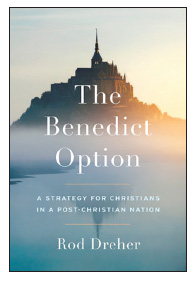How Can We Survive The New Dark Age?
Book review by John Morrissey The Benedict Option: A Strategy for Christians in a Post-Christian Nation, by Rod
Dreher (New York: Sentinel, 2017). Hardcover: 268 pages. ISBN: 978-0735213296.
The Benedict Option: A Strategy for Christians in a Post-Christian Nation, by Rod
Dreher (New York: Sentinel, 2017). Hardcover: 268 pages. ISBN: 978-0735213296.
Rod Dreher is an American writer who despairs of the future of the West and compares it to that of Western Europe at the fall of the Roman Empire. He points to the victory of today's liberal elite, evident in the ascendancy of gay civil rights; the removal of religious liberties for believers; and the number of young adults abandoning Christianity.
The flaccid response of the mainstream churches he describes as Moralistic Therapeutic Deism (MTD), which is but a "Christian veneer", accompanied by little questioning of materialism and consumerism, where the Market has replaced God.
Dreher himself is a former Protestant, turned Catholic, who has since embraced the Orthodox faith. His solution is that Christians adopt the practices and values of the sixth-century founder of Western monasticism, St Benedict, whose Rule provided communities of Christians with a road-map to be in the world but not of the world.
This does not mean being shut away from the world, but fortified with prayer and spiritual training, as well as by work and right order. In this book Dreher traces the separation of mankind from God through Nominalist philosophy, to the Renaissance, the Reformation, the Enlightenment, Marxism and to the present sexual revolution – the "Triumph of Eros", as he calls it.
To investigate the operation of the Benedict Rule in the modern world, the author visits the original Norcia foundation in Italy, re-opened in 2000 and now under an American monk, Fr Cassian Folsom. It is a detailed set of instructions, directed to find the presence of God in everyday life, in prayer, work, stability and hospitality. Its prayer is, "Lord Jesus Christ, Son of God, have mercy on me, a sinner."
It is not harsh, but moderate, in view of human frailty. Another example of the Benedict option is Tipi Loschi, an orthodox, counter-cultural, lay community, also in Italy, whose members live a traditional life tending vines and olive trees. Also cited are communities of Orthodox Jews, Latter-Day Saints (Mormons) and Evangelical Christians in the United States. Dreher invokes the example of the Czech dissidents under communism too, and the inspiring advice of Vaclav Havel to create and support parallel structures: "The best resistance to totalitarianism is simply to drive it out of our souls."
 Dreher devotes separate chapters to politics, education, work,
sex and even modern technology, with scathing assessments of
their current state. However, moderation is his watchword, with
cautions such as, "Don't let the Perfect be the Enemy of the
Good Enough", and encouragement to reach across church and
other boundaries.
Dreher devotes separate chapters to politics, education, work,
sex and even modern technology, with scathing assessments of
their current state. However, moderation is his watchword, with
cautions such as, "Don't let the Perfect be the Enemy of the
Good Enough", and encouragement to reach across church and
other boundaries.
Writing in 2017, the author may have under-estimated Donald Trump, in view of the U.S. President's subsequent Supreme Court nominations, his support for pro-life legislation and his adherence to his campaign promises; but Dreher maintains his scepticism about Christians putting their trust in conventional politics.
This does not mean for us to stop voting and withdraw from political involvement, however. He believes that the disorder in public life stems from disorder in the souls of Americans, and that voting Republican is an insufficient solution. In order to change the world, we have to start acting locally.
Dreyer believes that for Christians to try to reclaim their lost influence will be a waste of energy, the culture war having been lost. To build a Christian community, the family must become a domestic monastery.
Members should live in close proximity and buy from other Christians. Employment networks should be fostered and the trades rediscovered – especially as the professions are becoming increasingly unfriendly towards believers, be it from discrimination or the curbing of believers' conscience rights.
While Christians must be prepared to become poorer and marginalised, while never denying their faith, they should be prudent and avoid being "in-your-face" about it. It is more important to maintain a culture than to court actual or metaphorical martyrdom.
Dreher is adamant that education should be focused on Christian formation, with the study of Scripture and the history of Western Christian Civilisation foremost. He advises readers to withdraw their children from public schools, but not to be deceived about Christian schools fulfilling all their promises.
Establishment of classical Christian schools or homeschooling may be the only answer. At university level he stresses the importance of the Newman Centres on some American campuses, along with the Evangelical Centers for Christian Study, to maintain a community of believers and the formation of young Christians. In this, work and worship must be integrated, with a career not entailing separation from one's Faith.
The triumph of the therapeutic is another term which the author uses with regard to the sexual revolution. Because the majority of Americans have come to see sexuality as primarily for personal pleasure and self-expression, they now support same-sex marriage as a civil right, just as the media have played it, and even acquiesce to gender ideology.
Dreher reminds his readers of the Christians of St Benedict's time, who renounced sexual autonomy and the sensuality of pagan culture and redirected the erotic instinct to right-ordered sexuality in the marriage of one man and one woman, the fertility of the world and the care of animals. And celibate monks do not hate sex, as it is a gift from God. He advises parents to affirm the goodness of sexuality, neither to compromise nor moralise, to fight pornography, to be the primary sex educators, and to love and support unmarried people – whether straight or gay – for whom sexual continence is harder.
Dreher devotes a chapter of his book to biotechnology and the Internet, two areas which are be no means morally neutral applied science. True freedom lies in loving submission to God; but "technology man" sees freedom as liberation from anything not chosen by autonomous individuals.
Dreher points out how the destruction of embryos involved in IVF and the "floodgate of liquid modernity", which is the Internet, have reduced users to passive captivity. He explains the effects of its constant distraction, which alters the physiological structure of the young brain especially. His advice is to take away smart phones from children, practise digital fasting as a form of asceticism, do more things with our hands, and take social media out of worship.
Although written for an American audience, every criticism and caution which Dreher offers is applicable to us in Australia: the timidity of church leaders, the ambivalence of what is offered on the conservative side of politics, the ravages of the sexual revolution on ordered society, the dangers associated with modern technology, and the need for Christian communities to first fortify themselves against these dangers, and then to extend their influence to the wider society.
While Dreher may appear to contradict himself in places, as
in his advice concerning politics and parenting, there is a ready
answer to such criticism. St Benedict's insistence on moderation
in his Rule, a classical virtue dating from the ancient Greeks, is
Dreher's rationale for such cautions, alongside a call to Christian
heroism. His basic call is for a communion embodying love
for Christ and our neighbour – not self-improvement, saving
the world, or even saving the Church. It is a message we must
heed, however difficult it may be to implement only some of the
precepts offered by the Benedict option. ![]()
John Morrissey is a retired secondary school teacher who has taught in government, independent and Catholic schools. He lives in the Melbourne suburb of Hawthorn with his dog "Wreck".

